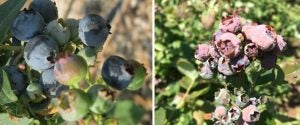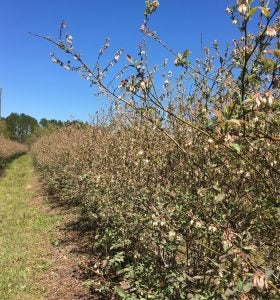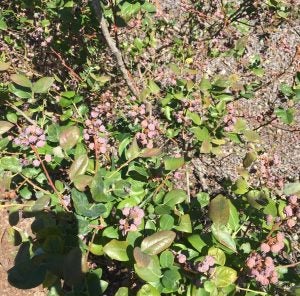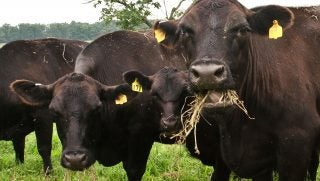“Appreciate your fruits and vegetables. This unusually warm winter brought early peaches and blueberries throughout southern Georgia and north Florida. Farmers were poised to get exceptional prices for early season fruit that could compete well against California and foreign products. Early Thursday morning one unprecedented cold night turned a great potential year into a disaster, with an estimated >$100 million crop loss. Thank a farmer, support ag research, buy fruits and veggies.”
This was a quote from Dr. Kevin Folta the Horticultural Sciences Department Chair at the University of Florida, Gainesville. And what a true statement this is! Buy fruits and veggies. Appreciate them. Although this freeze affected numerous fruit and veggie farms, this sad story inspired me to reach out to blueberry farmers as one example to hear how this weather has affected them.
Michael Williamson farms with his brother in Alma, Georgia, on 100 acres of pine trees, hay, and blueberries. He explains that a huge blast of cold air from the blizzard in the northeast affected this fragile blueberry fruit, and only farmers with overhead irrigation stood a chance.

“Some farmers tried everything they could, including burning hay bales for the smoke cover,” he said. “Time will tell if any fruit from our farm will make it this season. The rabbit eye blueberries were in full bloom.” He shares these photos and explains that the fruit was green the day before the freeze. The freeze turned them purple-ish, and they’d fall right off if you touched them now. They are expecting 90 to 100 percent crop loss and could not afford insurance. Many farmers are reporting 100 percent crop losses and are hedging their bushes to focus on next year.

What about those who had overhead irrigation? Lane Wade of Alma Berry Farms farms blueberries full time on 300+ acres in Alma, the self proclaimed “blueberry capital of Georgia.” He explains that the further along the bushes/berries are, the harder farmers got hit. Green berries are more susceptible to damage and there was a huge crop loss statewide.
“On our farm we have wind machines and water pumping. For frost protection, more than 100 gallons of water are pumped every minute. We are able to protect them pretty good, but I believe we have 40 percent loss.”
The frost protection process of protecting a blueberry crop is a fascinating one. Through the use of irrigation and wind machines, the temperature can be balanced and the buds can be protected as seen here. Wade explains his farm does carry insurance, which helps, but it is very expensive. Not a lot of farmers can afford it and many do not qualify.

Despite explaining the hard times and crop loss, Wade doesn’t want to portray a “doom and gloom” attitude. As I’ve mentioned in an article here, farmers really are humble and the eternal optimists. “We need buyers to know that good food will still come out of Georgia this year, it’s just not going to be the record crop we were originally expecting.” It’s important to farmers to not change perception and not run off buyers.
The pictures above are called “rabbiteye” and “highbush” blueberries. The rabbiteye bush can live 50 years or more and the berries are generally machine picked, while the high bush variety have a much shorter lifespan. Although the highbush variety were generally hand picked, the University of Florida and the University of Georgia have created many cultivators that require less chill hours and are machine pickable. As always, technology is improving and paving the way for better genetics/better pickers. The blueberry plants are called bushes although they’re as big as small trees/shrubs, and can yield 7,000 to 12,000 pounds of berries per acre.
As consumers, it’s important to never take these precious and delicate fruits for granted.
Michelle Miller, the Farm Babe, is an Iowa-based farmer, public speaker and writer, who lives and works with her boyfriend on their farm which consists of row crops, beef cattle, and sheep. She believes education is key in bridging the gap between farmers and consumers.



